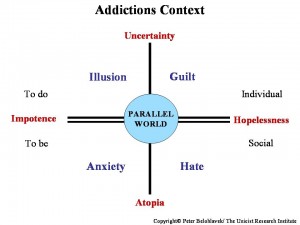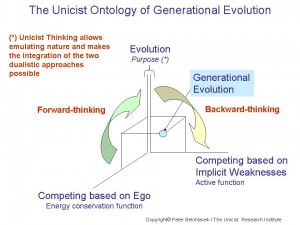The Unicist Theory of Evolution and Generational Evolution
How does generational evolution work? Why do many adolescents need addictions? Which is the environment for evolution or involution?
Successors need to overcome their parents. That is the golden rule for social and individual evolution. This implies that the evolution of the next generation depends on its capacity to build upon what already exists.
Metaphorically it can be said that in evolutionary cultures the roof of the parents is the floor of their children. In involutionary cultures the roof of the children is the floor of their parents.
To build upon the existing establishment it is necessary that we all improve the implicit weaknesses of what we have inherited. Extreme competition with the inherited establishment drives to a never ending story of frustration and entropy.
These are some conclusions of the research on Generational Evolution in Societies developed at The Unicist Research Institute. The research began in 1980 with the objective to find explanations to social evolution and to the worldwide expansion of addictions.
The reading of Diana Belohlavek’s book on Talent development is strongly recommended.
When living in parallel realities becomes a need
 Parallel realities become a need when individuals cannot deal with their own evolution.
Parallel realities become a need when individuals cannot deal with their own evolution.
Parallel realities are imaginary situations installed beyond the real world that are built upon fallacious beliefs or needs.
Fallacies are functional to humans. Individual fallacies reduce personal energy consumption, and fallacious utopias ensure the perception that something useful will be done.
While utopias function as action drivers, fallacious utopias function as empty “action promises”. Fundamentalism, considered as an objective characteristic an individual needs to survive, requires “living” in a parallel world to avoid self-perception.
To build this parallel world individuals use their projection capacity to deposit on the environment what they need to perceive in order to feel comfortable.
Addictions, the natural response to hopelessness
 Addictions are a natural response to an uncertain environment in which a person feels hopeless, impotent and without identity.
Addictions are a natural response to an uncertain environment in which a person feels hopeless, impotent and without identity.
When these conditions are given, individuals enter the shelter of addictions.
Addictions have a secondary benefit to help people to deal with hate, anxiety, illusions and guilt.
Addictions help to deal with these self-destructive feeling in a paradoxical way. While the individual is installed in the parallel world he feels fulfilled, but, after he returns to the real world, he feels worse than before and the need for addictive stimuli rises.
Addictions are infinite. The more unbalanced an individual is, the “heavier” the addictions he adopts.
 Considering the level of self-destruction or destruction four segments can be characterized:
Considering the level of self-destruction or destruction four segments can be characterized:
1) Pleasure addictions: providing instants of extreme pleasure.
2) Rational/spiritual addictions: providing sensation of absolute empowerment.
3) Suicidal addictions: providing the power of “dancing” beyond human limits.
4) Terrorist addictions: providing the power of feeling God.
Liberation from guilt: A business as old as humanity
Individuals feel guilty if they cannot overcome what they have inherited.
Guilt corrodes humans’ physical, psychological and spiritual health. Therefore “the liberation of guilt” has been a business that existed since mankind exists. It has been run from witchdoctors to psychologists.
Psychology opened a new perspective to human health. But it also settled the groundings of extreme individualism. The western hemisphere jumped from a sanctification of parents to blaming them for all the problems individuals have.
The problem of leading cultures and surviving cultures
The problem of the new generations of leading cultures is naturally the feeling of inferiority complexes to overcome the existing culture if they are in a leading environment.
Individuals have two alternatives: build upon the existing establishment or compete with it. Competition drives adolescents to guilt and the response requires needing to hate the situation and the individuals involved in it.
The paradox is that building upon an existing environment is also a competition. Building upon an establishment implies modifying the structure of the implicit weaknesses of a culture. This is something feasible for the next generation unless it was educated in an individualistic environment.
It has to be considered that individualism is the most degraded state of a culture. It implies that the interests of individuals prevail over the interests of the group.
A culture involves when individualism prevails. Surviving cultures include necessarily a dominant individualism. This is not the case of subsistent cultures where the group prevails over individuals. Surviving cultures produce survivors who necessarily are multi-addictive and need to behave as fundamentalists.
Evolution implies paying prices
 Accepting the validity of the establishment is a condition for evolution.
Accepting the validity of the establishment is a condition for evolution.
Over-adaptation to the establishment implies its sanctification, and drives to the avoidance of the responsibility of improving the environment.
Cultures that foster rebel individualistic behaviors necessarily generate involution. Both over-adaptation and individualistic rebellion drive to involution.
Evolution implies competing with the establishment improving what has been received in order to ensure evolution and create an own place in order to satisfy the personal needs.
The first part, the improvement of what has been received is a work with a social responsibility, the second part deals with the ego of the person who has assumed the responsibility.
A culture is in involution if individuals begin with their own egocentric desires. In both extremes, leading cultures and surviving cultures, addictions of any kind become a natural response.
Guilt liberators produce paradoxical results when they sustain their clients by “insufflating air” into their clients’ ego.
It is up to you. The prices to be paid are never low. You must believe in your capacity and see the implicit weaknesses of what you inherited.
You can find information on the Unicist Standard in the Unicist Business Search Engine: http://www.unicist.com
Request more information: n.i.brown@unicist.org
Peter Belohlavek
To translate this post, click on the title to open it and then click on your flag in the right menu.
If you would like to receive monthly information on new scientific developments, please register here.